In this article:
Onions are employed in numerous cuisines as they impart a nice flavor. They are also a good source of nutrients that provide multiple health benefits.
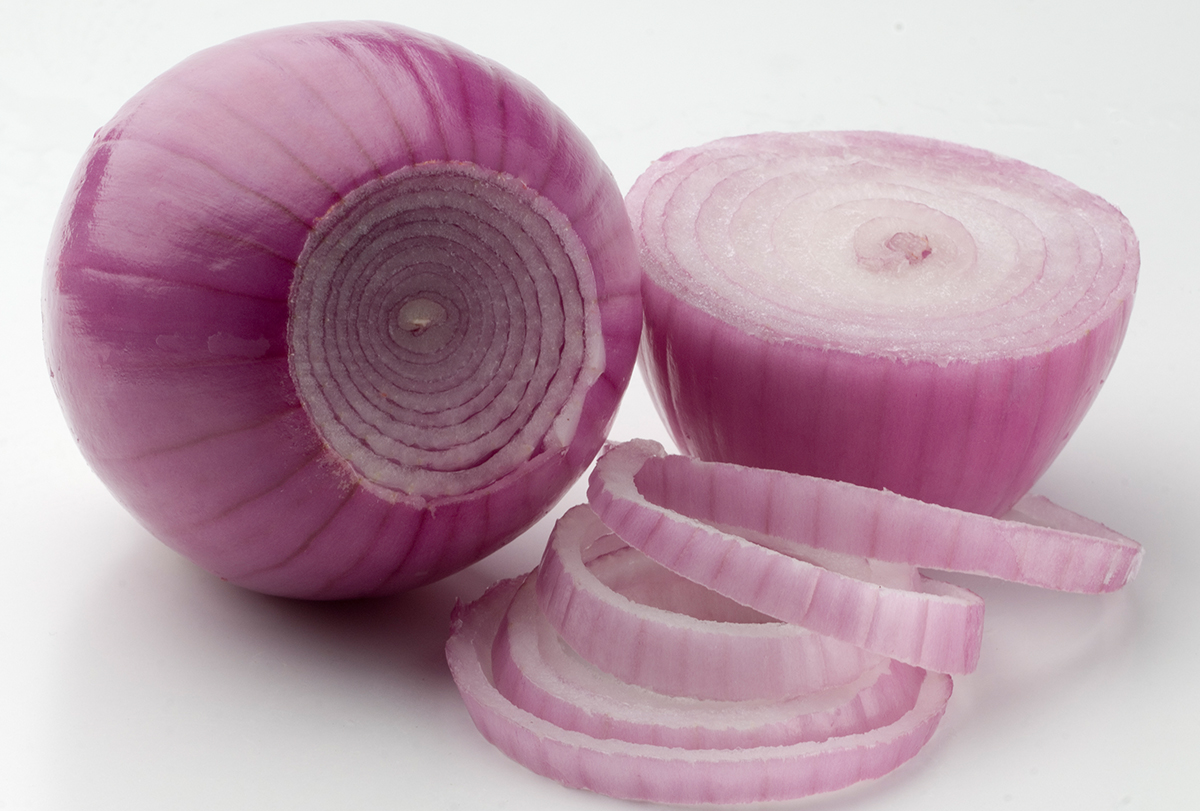
However, some people hesitate to eat onions because of the bad breath (halitosis) they get after eating onions. A persistent onion odor, also known as onion breath, can stay in the mouth for some time.
This strong odor is attributed to the sulfur compounds in onions. These sulfur compounds in food items with a powerful odor such as onions and even garlic, after being absorbed into the bloodstream following digestion, are transmitted to the lungs, and the exhaled air is distinguished by the odor of that respective food item. (1)
Home Remedies for Onion Breath
Here are some ways you can rid yourself of onion breath or oral malodor at home.
1. Drink green tea after meals
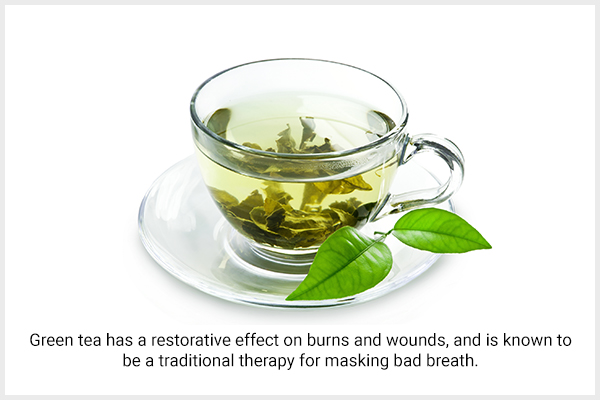
Green tea, obtained from the leaves of the Camellia sinensis plant, has multiple therapeutic benefits mainly due to its antibacterial and antioxidant actions. It also has a restorative effect on burns and wounds and is known to be a traditional therapy for masking bad breath.
Tea is native to China but quickly spread to India and Japan and then slowly to the rest of the world.
Green tea contains several polyphenol compounds called catechins that possess properties that aid human health. These compounds in green have been researched for their use on dental issues and have been shown beneficial for controlling bad breath. (2)
How to use green to get rid of onion breath?
Green tea may stave off bad breath by consuming it every day or employing it as a mouthwash before and after toothbrushing. You can also mix it with toothpaste and use it for brushing.
2. Drink water with lemon juice
In one study, where concentrations of lemon oil were studied for bad breath-causing agents known as volatile sulfur compounds (VSCs), it was noted that the production of salivary bacteria was enormously stopped and the VSC production also lessened after rinsing or gargling the mouth with the diluted lemon oil.
The researchers have, therefore, established that lemon oil can hinder the growth of salivary bacteria and decrease VSC production in patients with bad breath and can be be helpful for onion breath. (3)
How to use lemon to rid of onion breath?
- Add 1 tbsp of lemon juice or a few drops of lemon essential oil to 1 cup of water. Use this mixture as a mouthwash 2–3 times until the odor is driven off entirely.
- You can also consume a cup of fresh lemonade.
3. Rinse your mouth with mustard sauce
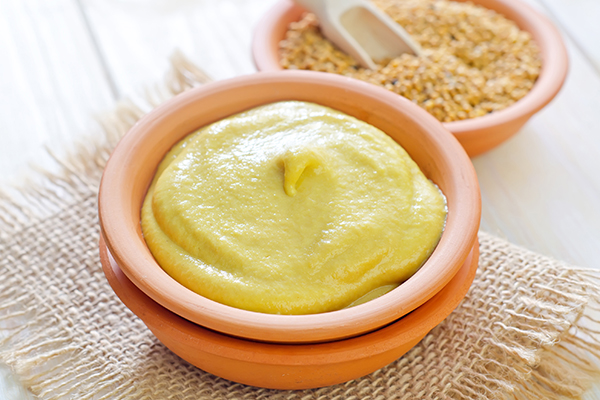
Oral malodor is a leading social and psychological problem that affects many people globally. VSCs are accountable for most of the oral malodor.
A study that determined whether compounds found in mustard such as allyl isothiocyanate (AITC) can eradicate VSCs and solve oral malodor indicated a high accuracy and sensitivity of mustard on VSCs. Therefore, mustard can be used to eliminate onion breath. (4)
How to use mustard to get rid of onion breath?
- Add 1 tsp of mustard sauce to half a cup of water. Swish it around for around a minute.
- Spit it out and rinse your mouth with water.
- Repeat, if necessary
4. Drink milk or dairy products after eating onion
Fat-free and whole milk and milk products such as yogurt can lessen the concentrations of VSCs in the mouth.
A study found that, due to its elevated fat content, whole milk was more useful than fat-free milk. Milk was also more useful than water in dealing with a persistent food odor in the mouth after onion ingestion. (5)
Good bacteria present in yogurt also have a similar effect on reducing halitosis. (6) Just eat a couple spoonfuls of yogurt with your onion-rich meal, or drink a glass of milk after meals.
5. Drink coffee after eating onion-containing food
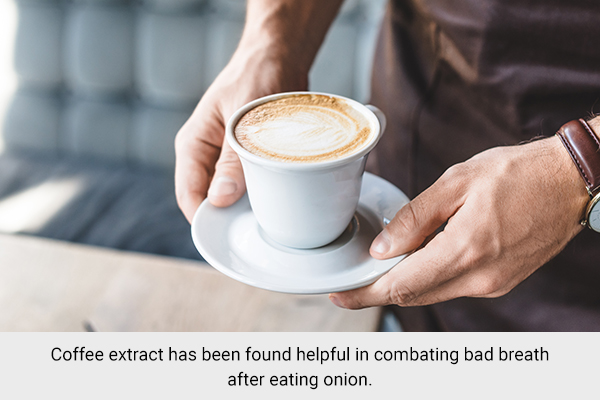
Coffee, a famously brewed drink all around the globe, comes from beans of Coffea arabica. It contains compounds that have antibacterial and antioxidant activities, including:
- Caffeic acid
- Chlorogenic acid
- Trigonelline
In one study, coffee extract greatly reduced the concentration of VSCs by 85%, thus being helpful in combatting bad breath after eating onion.
All you have to do is drink a cup of coffee after ingesting onion. (7)
6. Chew cardamom or drink cardamom tea after eating onion-rich foods
Cardamom, usually known as the queen of spices because of its extremely delightful aroma and flavor, has a record of being used in food and medicines. It is incredibly popular in the Indian subcontinent and is known for its tasty aroma and therapeutic properties.
In some regions, cardamom is used for flavoring hot beverages such as tea and coffee, but the most typical use of cardamom in India is as a breath freshener.
The oil from cardamom seeds is a mixture of terpenes, esters, flavonoids, and other components such as cineole, which is the primary active ingredient known to destroy bacteria that cause bad breath.
So, chewing cardamom after onion-rich dishes can be helpful. (8)
How to use cardamom to get rid of onion breath?
- Take a few green cardamom pods.
- Crush them and add to a cup of water.
- Boil the mixture.
- You can add milk and black tea leaves or drink this mixture as it is.
7. Drink peppermint tea or chew mint leaves
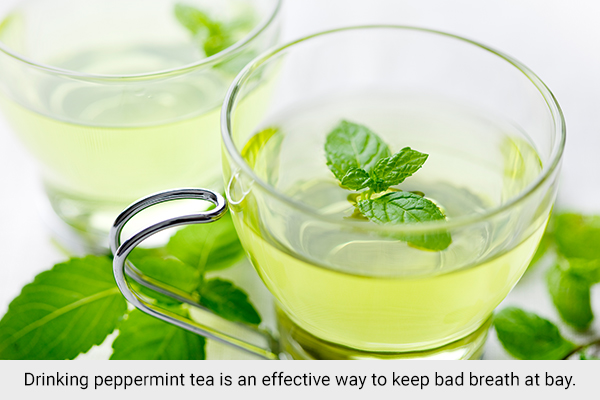
Peppermint is another effective way to keep bad breath at bay.
A study was done to check the relationship between bad breath and the effect of a peppermint rinse; it was demonstrated that the usage of the peppermint mouthwash was more substantially useful than a placebo. After a week, oral malodor was not seen in over 50% of the individuals in the mouthwash group. (9)
How to use peppermint to get rid of onion breath?
- Add 1 tbsp of crushed mint leaves to a cup of boiling water.
- Steep this mixture for 3–5 minutes.
- Strain the tea and add honey.
- Drink this tea numerous times a day.
- You can also crush fresh mint leaves and chew them.
8. Use baking soda toothpaste or mouthwash
Chronic oral malodor is a severe issue for a good fraction of the population. Since the most common reason for oral malodor is increased levels of VSCs, a treatment to lower these would be useful.
A study examined the usefulness of baking soda toothpaste in reducing breath odor. Volunteers brushing their teeth with baking soda-containing toothpaste noticed significantly reduced VSC levels.
The concluding remarks from such a study indicated that dental cleaning agents containing at least baking soda can lead to a substantial decrease in bad odor. (10)
How to use baking soda to get rid of onion breath?
- Add 1 tsp of baking soda to a cup of warm water.
- Use this mixture as a mouthwash numerous times a day.
9. Use essential oils to rinse the mouth
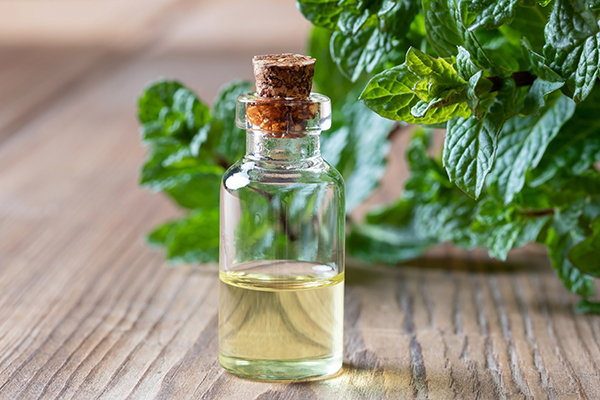
Essential oils are effective products that chemically and mechanically decrease the number of halitosis-causing microorganisms, mask bad odor, and chemically neutralize VSCs, which are the most useful ways to lessen VSC-producing bacteria.
Essential oils contain a combination of various therapeutically useful chemical substances such as terpenes, aldehydes, alcohols, esters, phenolics, ethers, and ketones. These are useful in the treatment of bad breath according to studies.
The most powerful of all these essential oils are: (11)
- Mentha oil
- Thymus oil (thyme oil)
- Tea tree oil
- Eucalyptus oil
Additional Tips to Reduce Bad Breath
Dentists recommend these ways to control bad breath:
- Brush your teeth with toothpaste. Regularly cleaning your teeth is a must for good oral health.
- Drinking water facilitates the production of saliva that aids in the removal of the bacteria that cause bad odor in the mouth.
- Flossing your teeth after a meal can also help prevent bad breath.
- When your mouth smells with onion breath, chewing minty gums can help.
- Use a mouthwash that contains chloride dioxide for instant relief from bad breath.
Causes of Bad Breath
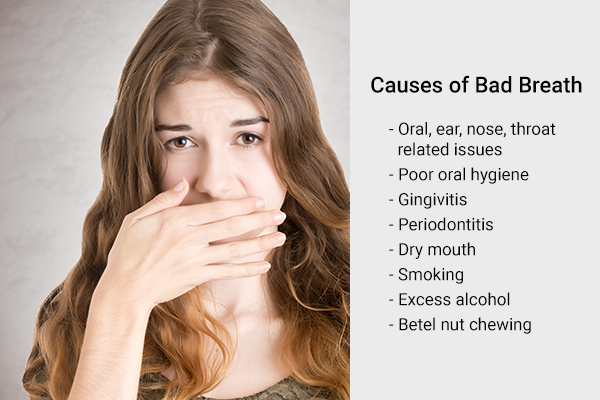
Bad breath can be due to: (1)
- Oral-, ear-, nose-, and throat-related issues
- Poor oral hygiene
- Gingivitis
- Periodontitis
- Dry mouth
- Smoking
- Excessive alcohol intake
- Betel nut chewing
Oral Malodor From Underlying Diseases
Different medical issues can also make your breath smell bad or give a characteristic odor to your breath. These include: (1)
- Diabetes – Fruity breath
- Asthma or cystic fibrosis – Acidic breath
- Kidney problem – Scent of ammonia
- Hepatic cirrhosis – Musty odor
- Trimethylaminuria – Foul odor
- Bowel obstruction – Fecal odor
- Ketoacidosis – Sweet fruity breath
Most-Asked Questions About Reducing Onion Breath
What is halitophobia?
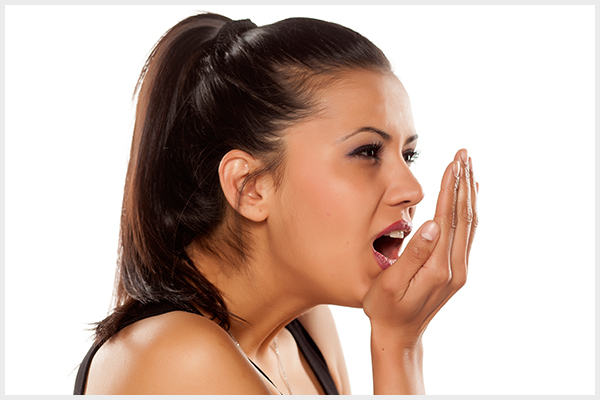
People who fear having bad breath or halitosis are said to have halitophobia.
How do I know if my bad breath is not from eating onions but a dental issue?
Ingesting onions isn’t the sole cause of bad breath. Halitosis can be a sign of serious dental issues. If the bad smell doesn’t go away with home remedies or stays for longer durations, you need a dentist to examine you.
A trip to the dentist, even a simple checkup, can cost a lot of money, but bad breath could be a life-threatening condition, so waste no time.
Practical Takeaways
Onion breath doesn’t last for life; it only lasts for a few hours. If you have plans of eating onions and you tend to get onion breath, carry a few mint leaves or cardamom with you.
If you have an interview or an appointment, you may need to completely steer clear of eating onions.
Other methods you can employ include:
- Drinking green or peppermint tea
- Using a mustard sauce mouthwash
- Eating yogurt with onion-rich meals
- Using lemon water as a mouthwash
- Brushing your teeth well
- Was this article helpful?
- YES, THANKS!NOT REALLY


